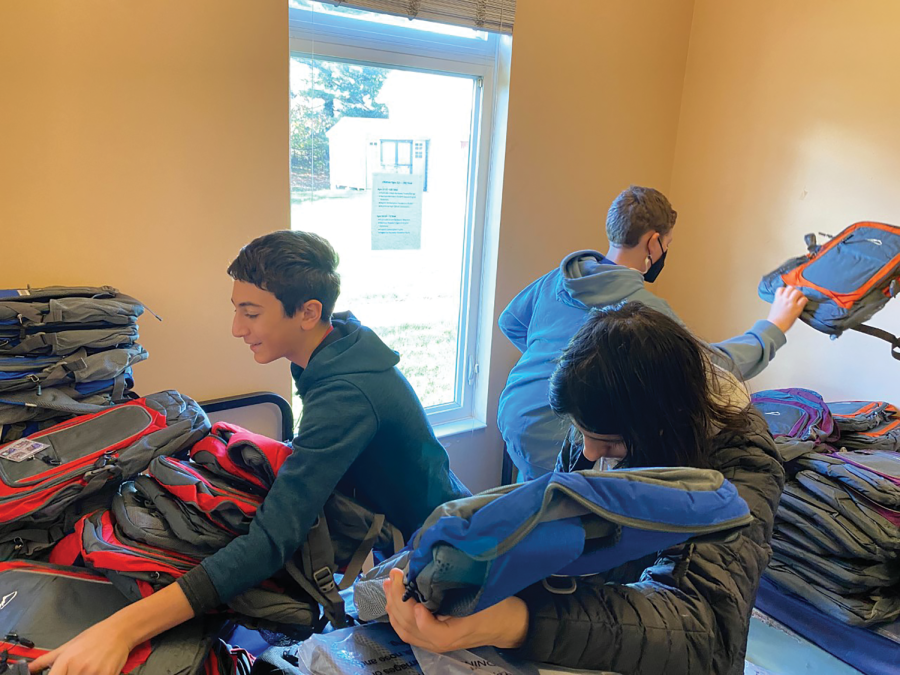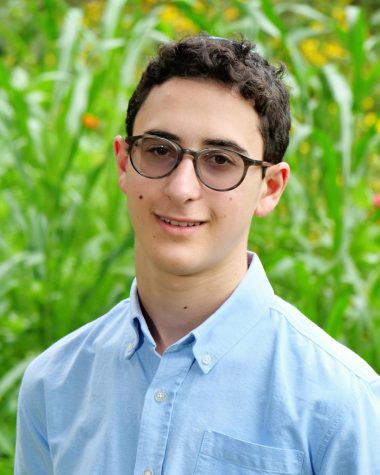Helping create a home away from home
Eighth graders Jonah Mitre, Micah Harkavy and Micah Brickman organize backpacks for recent immigrants during a November backpack drive.
January 8, 2023
The new Migrants Assistance Partnership, created by three CESJDS parents, works to increase assistance of migrants from the local community. Since their launch in Sept. they have organized events to put together toiletry kits and backpacks and trained volunteers to assist at a respite center for migrants.
The partnership was created in response to the recent rise in immigration from the southern border. Many southern states are struggling to handle the influx of migrants and are bussing migrants to cities like Washington, D.C. So many migrants have arrived in D.C, the Washington Post even called it “an unofficial border town.”
Deborah Appelbaum, mother of eighth-grader Jonah Mitre, along with Judy Liss, mother of freshman Ian Liss and Bob Polin, father of sophomore Allison Polin wanted to do something to help the new migrants in DC.
Appelbaum began volunteering with asylum seekers a few years ago. Appelbaum realized that migrants in D.C. often lacked basic necessities. While she knew that many stepped up admirably to help new migrants, she believed that more could be done.
“I believe that our community must do more, immediately, to meet this growing humanitarian crisis, as there are hundreds of newcomers with great needs who are bused here every week,” Appelbaum said.
The partnership began with Congregation Beth El in Bethesda but has expanded recently, as a few more synagogues and a church are interested in joining. Appelbaum believes that JDS Whatsapp groups have played a key role in growing the new organization.
“I put out the first notice [on the JDS grade parents Whatsapp group] about the backpack [drive], and five days later, people spent $2,000. That fast,” Appelbaum said. “It was inspiring to see that then 20 people from our group volunteered to pack those backpacks on four days notice.”
Volunteers put together backpacks for migrant students of all ages. For younger children, volunteers added crayons, storybooks and toys. For parents, they packed bags containing necessary items like smartphones.
Eighth-grader Henry Brenner, a student volunteer at the backpack drive, finds service like this to be very important.
“I think the more people that are willing and able to help that do, the better. There are so many people that are able to help and say they are willing to help, but don’t do anything,” Brenner said. “I think if you say those things then you should back up your words and actually help.”
The Migrants Assistance Partnership is pursuing closer collaboration with JDS. Appelbaum has been in touch with Dean of Experiential, Leadership and Service Learning Tori Ball, a member of the Diversity, Equity, Inclusion and Justice Committee.
“Having direct exposure to a migrant community and getting to learn more about the challenges they’re facing, and the things that help them get back on their feet is a good service experience for the students, and a good experience in terms of learning about diverse needs within our community,” Ball said.
The Migrants Assistance Partnership offers a large array of volunteer opportunities with SAMU First Response and the Hebrew Immigrant Aid Society (HIAS).
One opportunity open to students is to volunteer to help to serve meals and assist children at the SAMU respite center. Parents and students above 18 can also volunteer with HIAS to help migrants write resumes, improve their English and more.
People interested in getting involved can email debbyappelbaum@gmail.com.
“I like the idea of more direct service opportunities that are not just opportunities for service to the [migrant] community, but are opportunities to learn more about the community and get a better sense for what’s going on globally,” Ball said. “To understand that there are people who might need to leave their homes, and also to see, what does it look like for the globe to do good things for those people.”










